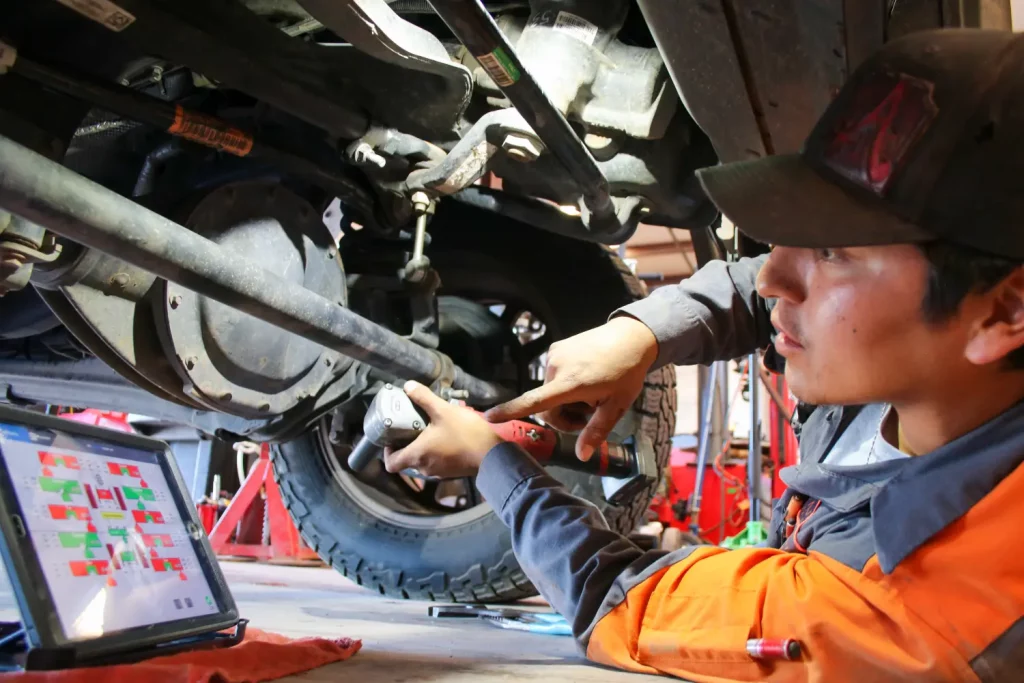In heavy-duty trucks, reliable performance is of utmost importance. From hauling heavy loads to navigating rugged terrain, these vehicles are built to withstand the toughest challenges. However, even the most robust machines can encounter electrical issues impacting functionality significantly. This discussion will explore the top 10 indicators that your heavy-duty truck may be experiencing electrical problems.
These signs should not be ignored, whether it’s flickering lights, random power failures, or unexplained malfunctions. By understanding these indicators, you will be better equipped to address any potential electrical issues and ensure the continued reliability of your heavy-duty truck.
What is a heavy-duty truck?
A heavy-duty truck, also known as a commercial vehicle, is a large and powerful vehicle designed to transport heavy loads over long distances. These trucks are specifically built to handle the demands of hauling and towing heavy items, such as construction materials or goods for long-haul transport. They are equipped with robust engines and durable chassis to withstand the stress of carrying substantial weight.
However, heavy-duty trucks are not immune to issues, including electrical faults like any other vehicle. Electrical repairing for Heavy Duty Trucks involve troubleshooting and fixing any electrical problems that may arise, such as faulty wiring, malfunctioning components, or electrical system failures. Identifying these problems is crucial in maintaining a heavy-duty truck’s optimal performance and preventing potential road breakdowns.
Key Features:
When considering the critical features of heavy-duty trucks, there are several essential points to discuss. These include the size and weight of the car, as well as its loading capacity. The engine power, stable safety features, and advanced suspension systems are crucial factors to consider. By exploring these points, we can understand the key features that make heavy-duty trucks reliable and efficient in their performance.
1. Size and Weight
Size and weight are critical factors to consider regarding heavy-duty truck electrical issues. Heavy-duty trucks are designed to carry large loads and endure long hours on the road, which significantly strains their electrical systems. The truck’s size determines the amount of electrical power needed to operate various components such as lights, air conditioning, and navigation systems.
Moreover, the weight of the truck affects the overall electrical load and can lead to increased wear and tear on the electrical components. It is essential to regularly inspect and maintain the electrical system of heavy-duty trucks to prevent any malfunctions or breakdowns. Suppose you experience any electrical issues with your heavy-duty truck.
In that case, it is recommended to seek professional assistance from a reliable heavy-duty truck repair or electrical truck repair service near you, such as Discount Diesel tire shop in Beckley, WV, that offers 24-hour truck and trailer tire repair shop services. They can diagnose and repair any electrical faults, ensuring the safety and reliability of your truck.
2. Loading Capacity:
The loading capacity of heavy-duty trucks plays a crucial role in determining their overall performance and efficiency. This key feature determines the maximum weight a truck can carry safely and reliably. A truck’s loading capacity is of utmost importance for businesses that rely on transporting heavy loads, such as construction companies and logistics providers.
It allows them to optimize their operations by ensuring that the car can handle the required weight without compromising safety or causing damage to the vehicle. When choosing a heavy-duty truck, it is essential to consider the loading capacity based on the business’s specific needs. By doing so, companies can ensure they have a reliable and efficient vehicle that meets their transportation requirements.
Also Read: Pros And Cons of Mobile Tire Repair Services For Ccommercial Trucks
3. Engine Power
With loading capacity being a crucial factor in heavy-duty truck performance, engine power is another critical feature. A powerful engine is essential for a heavy-duty truck as it directly affects its ability to carry heavy loads and navigate challenging terrains.
When the engine lacks sufficient power, the car may struggle to accelerate, climb steep gradients, or maintain a consistent speed. This can result in decreased productivity and increased fuel consumption. Signs of engine power issues include sluggish acceleration, difficulty climbing hills, frequent stalling, and decreased towing capacity.
It is essential to address these issues promptly to prevent further damage and ensure optimal performance. Regular maintenance and inspections can help identify and resolve engine power problems, ensuring that your heavy-duty truck operates at its full potential.
4. Stable Safety Features
Stable safety features are essential components of a heavy-duty truck, ensuring the protection of both the driver and the cargo. These features are designed to provide a secure and stable environment, minimizing the risk of accidents and injuries.
One key safety feature is the truck’s stability control system, which helps prevent rollovers and loss of control by automatically adjusting the engine power and applying selective braking to individual wheels. Another essential feature is the advanced braking system, which includes technologies like an anti-lock braking system (ABS) and electronic stability control (ESC), enabling the driver to maintain control during sudden stops or slippery road conditions.
Additionally, heavy-duty trucks are equipped with airbags, seatbelts, and reinforced cabins to protect the driver in a collision. These stable safety features ensure that the driver and the cargo are safeguarded, promoting a sense of liberation and peace of mind while on the road.
Also Read: The Ultimate Diesel Truck Repair Shop: Fast, Efficient, and Affordable
5. Advanced Suspension Systems
Advanced suspension systems in heavy-duty trucks enhance stability and improve overall performance on the road. These systems utilize advanced technology and engineering to provide a smoother, more comfortable ride, even on rough terrains. The key features of advanced suspension systems include adjustable air springs, electronic control modules, and adaptive shock absorbers.
One of the main benefits of these systems is their ability to automatically adjust to changing road conditions. This ensures that the truck remains stable and balanced, reducing the risk of accidents and improving safety. Advanced suspension systems can also enhance fuel efficiency by optimizing the truck’s aerodynamics and reducing drag.
Furthermore, these systems offer customizable settings, allowing drivers to adapt the suspension to their preferences and load requirements. This level of control enhances the overall driving experience and gives drivers a sense of liberation on the road.
6. Mobile Trucks:
Mobile trucks with various vital features serve as essential vehicles in multiple industries. These versatile vehicles offer liberation to businesses, providing mobility and convenience. With their ability to transport goods, equipment, and personnel, mobile trucks play a crucial role in the construction, logistics, and food services industries.
Key features of mobile trucks include spacious cargo areas, advanced storage solutions, and customizable interiors that cater to specific industry needs. Additionally, they are equipped with robust engines and durable chassis to handle heavy loads and challenging terrains.
Mobile trucks also offer flexibility in design and functionality, allowing businesses to optimize their operations and maximize productivity. Whether delivering supplies to a remote location or setting up a mobile food stall, these vehicles provide the freedom and efficiency that businesses desire.
How do I know if my heavy-duty truck has electrical issues?
To identify electrical issues in your heavy-duty truck, look for difficulty starting the vehicle, malfunctioning accessories, warning lights on the dashboard, unusual clutch behaviour, and flickering dashboard lights.
These signs suggest potential problems with the truck’s electrical system and should be addressed promptly to prevent further damage or breakdowns. Regular inspections and maintenance can help identify and resolve electrical issues before they escalate.
Difficulty Starting
Determining if your heavy-duty truck has electrical issues can be achieved by examining the difficulty it experiences when starting. Difficulty starting is a standard indicator of electrical problems in a vehicle. When you turn the key or push the ignition button, it could be a sign of electrical issues if your truck struggles to start.
This could be due to a weak or failing battery, faulty starter motor, or wiring problems. Pay attention to any clicking sounds or slow cranking when starting your truck. Additionally, if your car requires multiple attempts to create or stalls shortly after starting, it may be a symptom of electrical problems. It is crucial to address these issues promptly to avoid further complications or breakdowns.
Malfunctioning Accessories
One of the telltale signs that your heavy-duty truck may have electrical issues is if the accessories start malfunctioning. Malfunctioning accessories can be a frustrating experience for any truck owner, as they can disrupt the normal functioning of your vehicle and hinder its overall performance. These accessories can include your truck’s lights, radio, air conditioning, power windows, and other electrical components.
If you notice flickering lights, a weak or distorted sound from the radio, or any other irregularities with these accessories, your truck likely has electrical problems. It is crucial to address these issues promptly to prevent further damage and ensure the safety and reliability of your heavy-duty truck. Consulting a professional mechanic with expertise in electrical systems is recommended to diagnose and repair the problem accurately.
Warning Lights
How can you determine if your heavy-duty truck has electrical issues? One of the telltale signs is the presence of warning lights on your dashboard. These lights are designed to alert you to potential problems with your vehicle’s electrical system. Standard warning lights related to electrical issues include the battery light, alternator light, and check engine light.
If any of these lights illuminate, it is crucial to address the issue promptly to prevent further damage or breakdowns. Additionally, pay attention to any flickering or dimming of the dashboard lights, as this could indicate an underlying electrical problem. Regularly checking and understanding the meaning of these warning lights can help you identify and resolve electrical issues in your heavy-duty truck.
Unusual Clutch Behavior
Unusual clutch behaviour in a heavy-duty truck can indicate potential electrical issues. The clutch is an essential component that allows the driver to change gears smoothly. When the clutch starts behaving abnormally, it could mean an underlying electrical problem.
One common issue is the clutch needs to be more engaging and disengaging properly. This could be caused by a faulty clutch sensor or a malfunctioning electrical connection. Another sign of electrical problems is the clutch slipping, causing a loss of power and difficulty in shifting gears.
Additionally, if the clutch pedal feels soft or unresponsive, it could be due to an electrical fault in the clutch system. It is crucial to address these unusual clutch behaviours promptly to prevent further damage and ensure the safe operation of your heavy-duty truck.
Flickering Dashboard Lights
Flickering dashboard lights in a heavy-duty truck can serve as a clear indicator of potential electrical issues. When the lights on your truck’s dashboard flicker or dim unexpectedly, it could signify a problem with the electrical system.
This issue may range from a simple loose connection to a more complex wiring problem. It is crucial to address these issues promptly as they can lead to more significant problems, such as a complete electrical failure or fire hazard. To diagnose the problem, it is recommended to check the battery, alternator, and fuses for any signs of damage or malfunction.
Seeking professional assistance from a certified mechanic is advisable to ensure a thorough inspection and timely resolution of the electrical issue. Remember, taking immediate action will help prevent further complications and ensure the safety and reliability of your heavy-duty truck.
How do you fix Heavy-duty Truck electrical problems?
To effectively address heavy-duty truck electrical problems, it is essential to identify and diagnose the root cause. Once the problem has been identified, several steps can be taken to fix the electrical issues in a heavy-duty truck.
Firstly, checking the battery terminals for any loose connections or corrosion is essential. Clean the terminals if necessary and ensure a secure connection.
Next, inspect the wiring harnesses and connectors for any signs of damage or wear. Replace any damaged components to ensure proper electrical flow.
If the issue lies with specific electrical components, such as lights or sensors, it may be necessary to replace them. Consult the truck’s manual or seek professional help to ensure proper installation.
In some cases, heavy-duty truck electrical problems may require the assistance of a qualified technician. They have the expertise and tools to diagnose and repair complex electrical issues.
Regular maintenance and inspections can help prevent electrical problems in heavy-duty trucks. Keeping the electrical system clean and well-maintained will contribute to the overall performance and longevity of the car.
Frequently Asked Questions
How Much Does a Heavy-Duty Truck Typically Weigh?
A heavy-duty truck typically weighs between 33,000 and 80,000 pounds, depending on its configuration and purpose. Factors such as the type of engine, chassis, and additional equipment can also impact the vehicle’s overall weight.
What Are Some Common Electrical Components in a Heavy-Duty Truck?
Standard electrical components in a heavy-duty truck include the battery, alternator, starter motor, ignition switch, wiring harness, fuses, relays, sensors, lights, and electrical control modules. These components are essential for the truck’s electrical system to function correctly.
Are Electrical Issues in Heavy Duty Trucks Dangerous?
Electrical issues in heavy-duty trucks can be dangerous as they can lead to a loss of power, malfunctioning of safety systems, and even fires. It is crucial to address any electrical problems promptly to ensure the vehicle’s and its occupants’ safety.
Can I Still Drive My Heavy Duty Truck if It Has Electrical Issues?
If a heavy-duty truck has electrical issues, it is not advisable to continue driving it. Electrical problems can cause significant malfunctions, compromising safety and potentially leading to accidents. It is crucial to address these issues promptly and seek professional assistance.
How Often Should I Have My Heavy Duty Truck’s Electrical System Inspected?
It is recommended to have your heavy-duty truck’s electrical system inspected regularly by a professional technician. Routine inspections can help identify potential issues before they escalate, ensuring your vehicle’s safe and efficient operation.
Conclusion
In conclusion, identifying and addressing electrical issues in heavy-duty trucks is crucial for ensuring their optimal performance and safety. By observing the indicators mentioned in this article, such as dimming lights or malfunctioning electrical components, truck owners can take appropriate measures to fix these problems. Regular maintenance and timely repairs can mitigate the risk of electrical failures and improve heavy-duty trucks’ overall efficiency and reliability.



